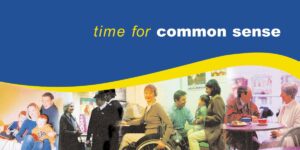According to the UK Green Party website the Green Party will try to achieve the following if they gain power at the 2010 general election:
Disabled Terms used
DY100 For the purposes of this policy base, the term ‘disability’ refers not to the situation of having a physical, mental or other impairment. Instead it refers to the widespread phenomenon of people being unable to do things in society specifically because society has failed to reconstruct itself (physically and culturally) in all the possible ways that would ensure that an individual’s impairments are not a barrier to their full participation.
Disabled Background
DY200 There are currently two basic approaches to the subject of disability:
a) The medical model of disability focuses on an individual’s impairment as the root of the problem. The impairment (e.g. no use of the legs) causes the disability (e.g. inability to walk) and the result of this is handicap (reduced ability to participate fully in society).
This approach has been rejected by many disabled people; it has been almost totally defined by non-disabled people – often by administrators who define disablement in the way most suited to bureaucratic convenience, or by charities not controlled by disabled people themselves, who frequently promote an image of disabled people’s powerlessness that reinforces existing prejudice against disabled people.
This medical model of disability (or ‘charity’ model or ‘administrative’ model) has led to a general acceptance that disabled people cannot fully participate in society; and therefore that where society makes ‘special’ efforts to meet the needs of disabled people, this is a kindness on the part of non-disabled society for which disabled people must be grateful. Disabled people are seen as incomplete people to be regarded as tragic objects of charity whose aim in life is ‘to overcome their handicap’ and be as much like a non-disabled person as possible.
b) The social model of disability focuses on society’s response to impairments as the root of the problem. A person has an impairment, and society, by failing to take into account the needs of such a person, disables that person. If this person cannot, for example, enter a certain building or get on a bus, it is not fundamentally their own impairment that is the problem, but rather the way in which the building and the bus have been designed – unreasonably excluding some people.
Similarly, people with intellectual impairments are disabled by segregation from the rest of society, which restricts their opportunities to learn a whole range of skills, including social skills, that are normally developed through interaction with others.
This model of disability widens the definition to include people living with long-term mental health problems, who are also socially disabled and marginalised. It also includes people with temporary impairments, such as a broken leg, who encounter many of the same obstacles as people with permanent impairments.
According to the social model of disability, notwithstanding the fact that individuals’ personal experience of their impairments may be negative and in some cases painful or hindering, society as a whole has created disability because it has failed to take into account the needs of people with impairments. It is non-disabled society that has created the barriers to full social equality for people with impairments, and it is non-disabled economists and politicians who tell us that ‘we’ cannot afford the cost of removing those barriers. Disability is a human rights issue; and human rights are not to be denied some people by the oppressive fiscal calculations of others.
The social model approach demands an integrated society. This does not just mean integrating disabled people into a non-disabled world; it means re-defining society according to the perspectives of all people, not just the non-disabled.
This understanding of disability has been growing stronger in recent years, and is the only approach acceptable to the British Council of Organisations of Disabled People.
The Disabled Principles and policies
DY300 The Green Party rejects the medical model of disability and accepts the social model:
a) that disability is a social phenomenon;
b) that while many individuals have physical or sensory impairments or learning difficulties or are living with mental health problems, it is the way society responds to these which creates disability;
c) that disability is a form of oppression.
DY301 The medical model will not be invoked with reference to ‘disability’ but will be utilised only in the assessment of impairments as part of the process of meeting an individual’s desired (or, in restricted cases, perceived) need to receive support etc. and for the purposes of defining the ‘disabling’ factors in society that are to be reconstructed.
DY302 The Green Party aims to help deconstruct disablement as a form of oppression; to assist the enablement of people whom society has previously disabled. This will be achieved through various policies which may be categorised as educational, environmental, social and political.
I would be interested to hear both positive and negative views on UK Green Party’s The Disabled policies in the comments below?














The Green party is very passionate about what they believe but they are circulating a lot of inaccurate figures. They keep saying that replacing Trident will cost £100 billion. That’s nonsense! Even the CND website only says £76 billion and that is an estimate of what it would cost to replace, run and maintain the whole system for forty years including all the salaries of personnel. But you’ve got to have a navy so all those people would be paid anyway.
The Government’s own figure for replacing the system is £12-20 billion out of which 60% is the cost of the actual submarines. We would need those anyway, nuclear or not, so it’s more accurate to say that the cost of the nuclear warheads is a maximum of £8 billion.
The system last for 40 years so that comes to £200 million per year, in other words £3 per year for each citizen, man, woman and child. The cost of a sandwich or the cost of remaining a world power.
Trident makes a profit as we use it for such things as patrolling the valuable oilfields around the Falklands, which we couldn’t drill without having a deterrent.
For more information, see my website above and below.
Don’t be taken in by the BBC. They want you to believe there are only three or four parties to vote for. Not true. The LibLabCon are all crooks, and even the new boy Nick Clegg took £3.5 million in illegal donations to his party, then brazened it out.
The EU rules us now, and unless you vote to leave it you are wasting your vote. We are in favour of electoral reform and less bureacracy.
VOTE UKIP.
Well I will never vote UKIP same as voting BNP, but sadly i will not vote Green 25 billion 50 billion 100 billion for nukes which will never be used seems ridicules the UK should be saying no sorry no more Nukes we must live without them.
But i note the green need to go on a disability awareness course as well some of the words naughty naughty nobody is handicapped, what you think we are winning horses.
The fact is society does cause people with no legs problem for example steps pesky things, stairs pesky things, tiny little small lifts no thanks.
But of course when you want a person to work you want the best even if it’s making a cup of tea, not somebody in w wheelchair, jobs are not charities in fact working for a charity they need the best, I think killing anyone with a disability is best and Boy do i have disabilities, kill me.